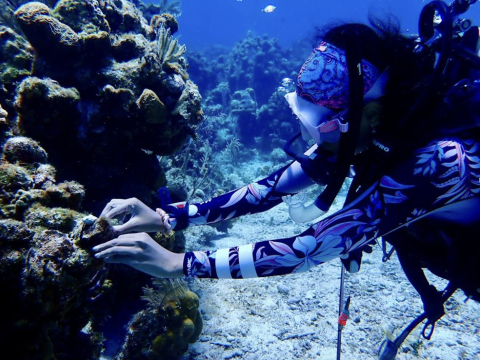Honduran diver brigades restore coral reefs damaged by hurricanes
Honduran diver brigades restore coral reefs damaged by hurricanes
Emergency teams swiftly repair hurricane-damaged coral reefs across Central America, using insurance-backed methods to ensure rapid recovery and resilience. This story is part of a series celebrating the locally-led solutions supported by the UNDP implemented - Adaptation Fund Climate Innovation Accelerator programme.
A hurricane hits.
As soon as it is safe, repair teams dive down to clear debris from coral reefs around Honduras, Belize, Guatemala and Mexico.
They recover coral fragments, buried under the sediment by strong storm currents. They also remove the litter and solid waste washed into the reef.
“Then, they reattach the fragments; whatever fragment is still alive,” says Claudia Ruiz, a project coordinator for the Mesoamerican Reef Fund (MAR Fund).
She says all of this must happen within two weeks of a hurricane impact to avoid permanent damage to the coral ecosystem.
MAR Fund and their partners work to procure insurance coverage for emergency reef response at 11 reef sites in the MAR region, and they train the emergency response divers.
She says a key innovation of the MAR Fund’s approach was to consolidate insurance coverage for multiple sites to help reduce the cost of premiums. The insurance coverage includes stipends to reimburse the reef divers for their time and expertise. Insurance to protect reefs and marine ecosystems are extremely rare in the world.
Two of the sites, mainly in Honduras, were insured using a grant from the UNDP-Adaptation Fund Climate Innovation Accelerator (AFCIA). UNDP-AFCIA accelerates innovative technologies, practices and business models for local adaptation through tapping into the incredible potential of NGOs, civil society, women and young innovators.
A portion of that grant was also used to train the brigade members. While most are seasoned divers highly experienced in navigating Caribbean reefs, the art of reef repair is new to them.
They learn, for instance, to identify and retrieve the broken coral fragments that are still alive.

“What they do is to reattach it to other fragments or to other parts of the coral that are still alive and steady,” says Ruiz. “That is called stabilisation; they stabilise the fragments scattered around the reef.”
She says they learn to reattach the fragments using cement as an environmentally-friendly agent. Where it is not possible to reattach live coral tissue, they move the fragments to nurseries.
It is important to have at least one nursery nearby the reef for these fragments, says Ruiz. The best is to nurture them in situ, where they belong, to avoid genetic or other changes. But, she says, it is also possible to take them out of the ocean and into a laboratory to recover.
If a storm is too strong, entire crests of reef can be flipped out in a surge. When this happens, divers can’t place the crest in the nursery, but they must try to stabilise it and reattach it to the sediment.
Divers also learn how to monitor the health of the reef in general. A specialised team within each brigade is responsible for this task so that the coral ecosystems are also proactively protected between storms.
Upon completion of their training, brigade members earn diplomas that enable them to offer reef repair expertise beyond this particular MAR Fund project.
Ruiz says people who volunteer to join the reef response brigades have a shared commitment to environmental conservation. Some work as tour operators or diving instructors when they are not repairing reefs, while others are simply concerned community members, government officials or others in the NGO sector.
Cettina Cantu is a tour operator and diving instructor who also now works as a Reef Response Brigadier in Mexico. “As brigadists in response to damages after a hurricane, we have a protocol to make a study of the reef; of the areas that are more damaged. From there we determine which areas need prompt help and give the support that is needed,” she said in a translated interview for a MAR Fund video.
Because many brigade members have other duties and can’t stay in one place for extended periods, Ruiz says they’ve now also adopted a train-the-trainer approach to sustain skilled brigades.
These trainers are equipped to provide shorter, intensive courses to ensure a rapid response when a storm event is imminent.
In the context of climate change, such storms are becoming ever more frequent and severe. This threatens the nearly 6.2 billion USD in ecosystem benefits that coral reefs provide the Caribbean region, according to a 2022 short film published on the MAR Fund’s YouTube channel.
In an interview for the film, the CEO of the Caribbean Biodiversity Fund, Karen McDonald Gayle, said, “A strong coral reef and a healthy coral reef, is an important aspect to protecting the coastal areas of our islands in the Caribbean from storm surge and the effects of a hurricane and other rain events.”
This is why the MAR Fund has made it its mission to promote reef resilience in the region.
About this article:
This story has been co-created with support from MAR Fund, UNDP, CDKN, ICCCAD, and GRP, under the framework of the UNDP-managed Adaptation Fund Climate Innovation Accelerator (AFCIA).
The UNDP-AFCIA programme counts on financial contributions from the Adaptation Fund and the European Union and has awarded 44 micro and small grants to locally-led organisations across 33 countries worldwide, accelerating their innovative solutions to build resilience in the most vulnerable communities.
UNDP-AFCIA, is one of the funding windows anchored under the Adaptation Innovation Marketplace (AIM), a multi-stakeholder strategic platform that promotes scaled-up adaptation at the local level, launched by UNDP Administrator Achim Steiner at the Climate Adaptation Summit in January 2021.
